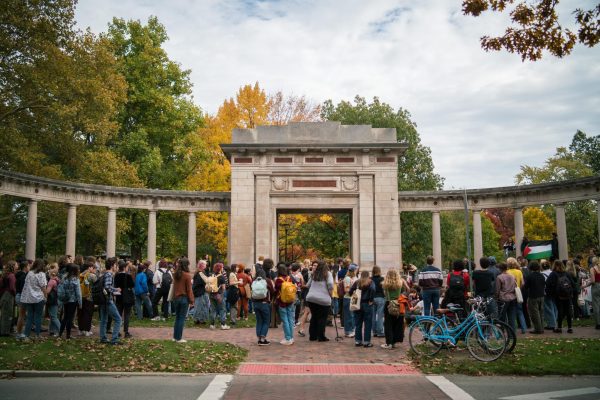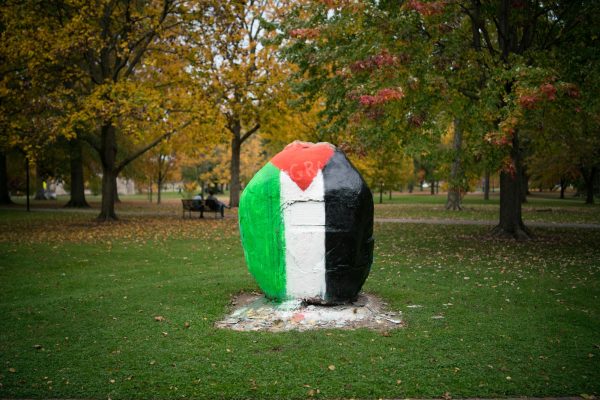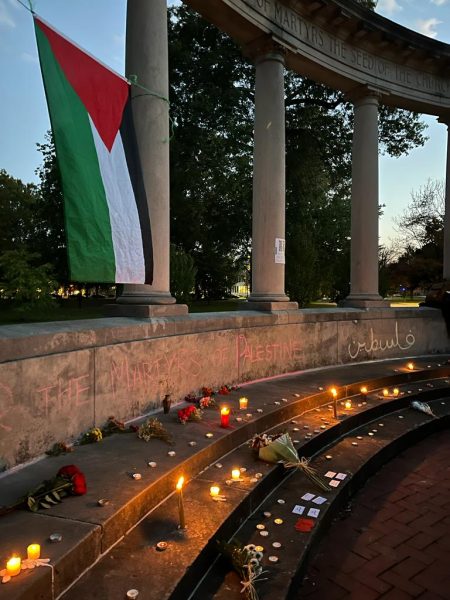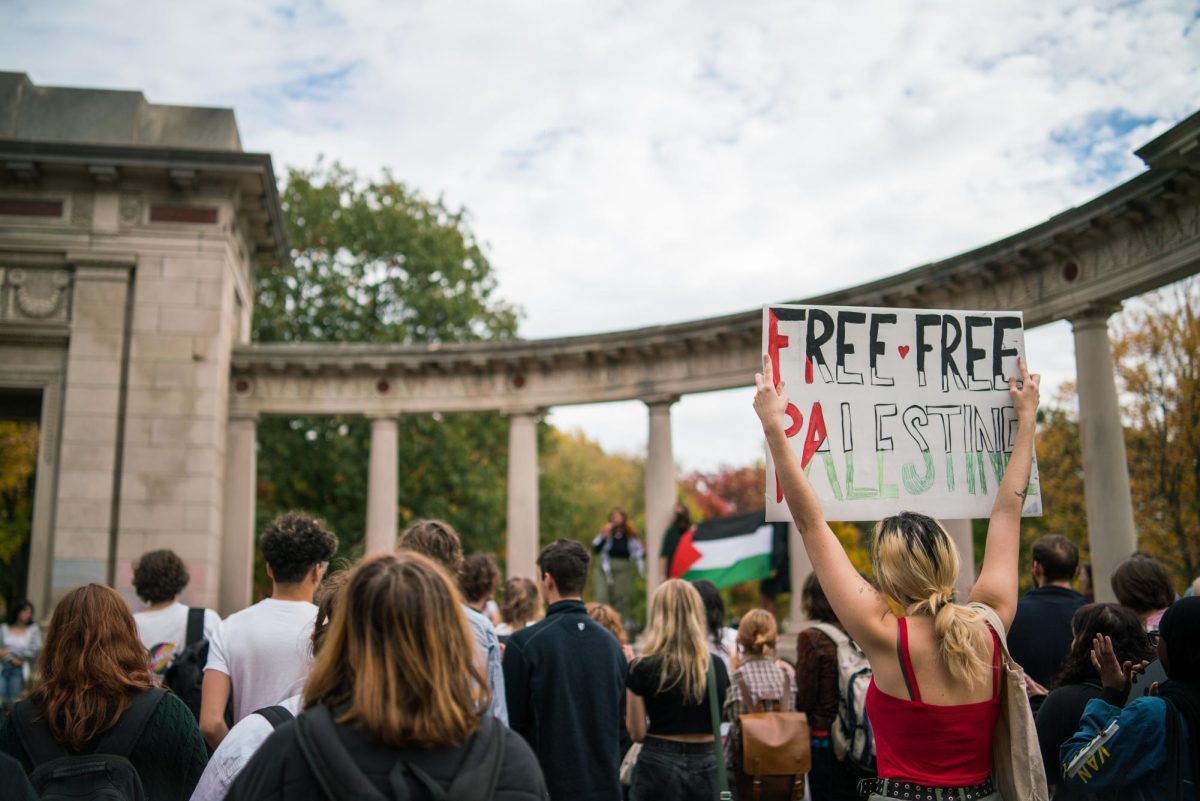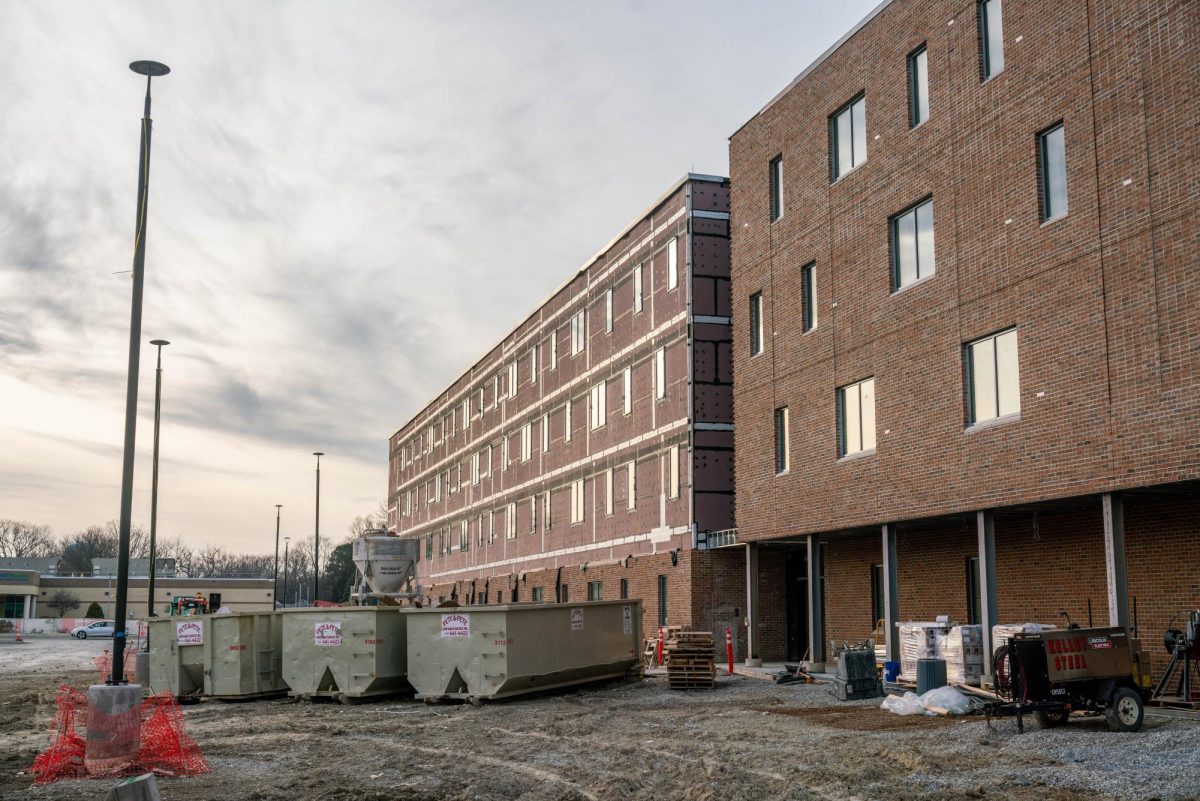Editors’ Note: This article contains references to grief, death, and topics that may be upsetting or triggering for some readers.
At 1:45 p.m. Wednesday, Oct. 25, Oberlin students left classes, rehearsals, and their studies to gather at the Memorial Arch in Tappan Square. This walkout, organized by Oberlin’s chapter of Students for a Free Palestine, was part of a larger, national walkout to show solidarity with Palestine. Carrying a Palestinian flag, College second-year Juwayria Zahurullah and other SFP members led the students in recitations of pro-Palestinian chants such as “From the river to the sea, Palestine will be free,” as they marched around the perimeter of Tappan.
Since Hamas’ Oct. 7 attack on southern Israeli cities near the Gaza Strip, and Israel’s formal declaration of war against Hamas the following day, events have been held on campus by an array of organizations to mourn and engage in open dialogue.
On Wednesday, Oct. 11, SFP hosted a vigil for Palestinian lives lost. In the days before and after the vigil, President Carmen Twillie Ambar issued statements to the Oberlin community, emphasizing the necessity of finding “strength and hope in our shared humanity.” Additionally, Multifaith Chaplain David Dorsey and Assistant Dean and Director of the Office of Religious and Spiritual Life Samia Mansour held space for students affected by the events. Director of Chabad at Oberlin Rabbi Shlomo Elkan also offered the opportunity to speak with the co-directors of Chabad at Oberlin, himself and Devorah Elkan, to anyone in need of support.
Zahurullah, SFP’s social media manager and secretary grew up attending vigils for Palestinian victims of Israeli occupation, some of whom were members of her own community. During fall break, she attended a protest in Chicago, where thousands marched in support of Palestine.
For Zahurullah, one of the most important things to emphasize about this current conflict, where even the rhetoric used to describe it is contentious, is that it did not begin two and a half weeks ago.
“This has been going on for years and years and decades, since the 1940s,” Zahurullah said. “I think that’s a major piece of context that a lot of people are missing when they talk about this event and, a lot of times, contributes to the ‘both-sides’ narrative that goes around a lot.”
In the week before fall break, and in the week following, students like Zahurullah have reported a lack of adequate communication from institutions on campus regarding Palestine and Palestinian people.
“We held our vigil the week before break, and I think part of the reason was because there were a lot of spaces advertised by the College that were specifically for Jewish students mourning death, and specifically related to events in Israel,” Zahurullah said. “We just wanted to create a space to remind people of [Palestinian] humanity and to mourn them as well. … What I’m noticing in the last two weeks is the general attitude towards the issue has been dismissive towards the side of Palestinians, and part of that is namely that it refuses to name Palestine — in all the correspondence it just says Gaza, and that still refers to it as the Israeli-occupied land.”
Not long after the vigil dispersed, the candles were extinguished, and the chalk was washed away. When SFP brought concerns about this interference to administration, they were told that chalk couldn’t be written on vertical surfaces such as the columns of the Memorial Arch.
“We [also] had a banner outside of Wilder [Hall] that was taken down sometime overnight, and we asked them, ‘Are you going to look into it?’” Zahurullah said. “They claimed they did, but I find it hard to believe that there’s no camera footage that could show someone taking a banner from the side of Wilder, especially because there was one instance where two students were sitting on the Wilder porch playing music and waving an Israeli flag. They were in complete view of Campus Security, and not even 30 minutes later we tried to hang up our banner, and within 10 minutes a Campus Safety officer came over and started untying it. I don’t understand how those two students were standing in view of Campus Safety for like an hour waving a flag that they didn’t have a permit to do, but ours was taken down.”
In the last few weeks, College fourth-year Allison Lupatkin has similarly observed what she feels is a lack of sufficient response to the current conflict. Lupatkin was involved in Oberlin’s chapter of J Street U when it was active on campus. J Street U operates as a primarily pro-Israel organization aiming to educate students on Israel-Palestine and advocate for a two-state solution.
“I thought there would be more activity on campus, honestly,” Lupatkin said. “I feel like I’ve been surprised by that [because in] a lot of the Jewish spaces I grew up in, I was taught that saying ‘Free Palestine’ is antisemitic. I don’t personally agree with that, but for instance, when I committed to Oberlin, my grandmother was worried about it because she was worried that liberal arts college meant antisemitic. I definitely came into Oberlin with a lot of apprehension on what the organizing and political scene would look like and how I would fit in. Honestly, the response on campus has sort of matched what my impressions have been, which has been a little frustrating. … Oberlin Jewish life doesn’t talk about politics, which is pretty unique for a campus with Hillel and Chabad to not talk about Israel.”
The general consensus among students is that Oberlin’s response has been incomplete. To Conservatory third-year Kayla Shomar-Corbett, whose family is located in Gaza and whose father immigrated from the Gaza Strip, grieving “lives lost in the Middle East,” as written in the Campus Digest to promote a vigil led by President Ambar, is an example of “both-sides” rhetoric.
“Is it perfectly fine to grieve? Yes,” Shomar-Corbett said. “I encourage people to grieve loss and mourn because that humanizes these tragedies, but I also think that I see a lot of people putting what I know to be genocide as ‘this war.’ … When people call this a war, when people call Hamas a terrorist organization and say, ‘We should condemn Hamas,’ I think, ‘Well, who’s condemning the IDF?’ It’s a really frustrating double standard. Whenever there is a global issue, [Middle Eastern and North African] Americans and MENA people in general are always required to condemn things that I thought we already knew were bad, like murder. ‘Both sides’ rhetoric always gets me into that headspace of, ‘You guys really don’t see this the way that I do.’”
College third-year Zane Badawi, who is half-Palestinian, wrote a piece in the Review (“Palestine Needs Oberlin’s Jewish Voices,” The Oberlin Review, Sept. 29, 2023) explaining his perspective on Palestine and calling on his Jewish peers to use their voices to talk about Israel and Palestine’s relationship — something he hopes to see more of moving forward.
“I’d like for people to reach across boundaries because, as strongly opinionated about this as I am, I think at this point and especially in this space, it’s important to talk to people they disagree with and voice their opinions in a respectful way, and make sure a sort of cross-communal interaction is happening,” Badawi said. “From a Western perspective, a lot of what you’re getting is, ‘Palestinians are terrorists,’ and, ‘The Hamas attack was a part of a larger pattern,’ and, ‘This war waged by Israel is retaliatory.’”
Over the past few weeks, many have sought out context for the ongoing crisis, such as information about the history of Israel and Palestine, through social media. Shomar-Corbett, Zahurullah, and many other Oberlin students perceive social media activism — whether it’s the distribution of infographics on Instagram or videos and photos from protests — as a complex issue.
“Speaking on behalf of SFP, we’ve been very careful in choosing our words and choosing what we spread and post [on Instagram] to not push a divisive narrative,” Zahurullah said. “I think in a lot of the combative responses we get, that is what instills divisiveness. … SFP has gotten negative comments on our posts reinforcing the stereotypes that Palestinians are barbaric animals and that we’re supporting terrorism. … We did delete them, [but] we’re not going to do that anymore.”
With social media comes accessibility and circulation of information that brings tragedy out of the abstract, which many students emphasize as a benefit of online platforms. In these last few weeks, Zahurullah has noticed Palestinians in Gaza recording videos in English to broadcast their stories and presumably to make them accessible to Western audiences. Still, social media can exacerbate division and misunderstanding.
“Something that has really frustrated me a lot has been social media discourse, and how everything is so far to one extreme or the other,” Lupatkin said. “A lot of my peers from high school are posting very strong ‘stand with Israel’ sentiments and if you tried to mention the bombings on Gaza, you’re shut down. Whereas on the other end of the spectrum, I have friends where everything they’re posting is about the attacks on Gaza. But, if I tried to mention, ‘Hey, I’m scared for my friends I have who live in Israel,’ then you get shut down as well. I wish [there was] more acknowledgement that there are Israelis and Palestinians on the ground who are being affected, who are suffering, and this is not a conflict you can make such broad generalizations about.”
Like Lupatkin, College fourth-year Zach Gershon previously led Oberlin’s chapter of J Street U. Gershon grew up attending Jewish summer camps and has visited Israel, both on a youth group trip and with family. He has also been privy to pro-Israel sentiments on social media.
“What I’ve seen on social media has been a bunch of polemics from both sides,” Gershon said. “A lot of my Jewish friends, some of my friends from summer camp, [and] some of my coworkers who are in Israel who I’m concerned about, have been posting a lot of extremely pro-Israel stuff and some of it I agree with but some of it I don’t. Over here at Oberlin, I tend to agree with some of the pro-Palestinian stuff, but not all of it. I would consider myself pro-two-state solution or pro-bi-national state — I do think while Israel has a right to exist and a right to self-determination, Palestinians are also deserving of that same right.”
Gershon, Lupatkin, and Shomar-Corbett all referenced friends and family in the region who have died, been kidnapped, or been hospitalized as a result of the conflict.
“I’ve struggled a lot,” Shomar-Corbett said. “My cousins were in the hospital because of bomb debris. All I want is for people to treat that struggle like it’s something important and that it’s something worth talking about. … After the [SFP] vigil was defaced and so much of the chalk was erased time and time again, I felt like people were uncomfortable with seeing Palestinian trauma and acknowledging that. It just felt like a punch in the face, like you guys really don’t care about us … which is the ‘otherism’ and isolation I felt. There was a time on campus during the week before break where I felt like I couldn’t even leave my house, because if I left my house I was opening myself up to this world of possibilities of getting hurt again, getting my trauma, my peers’ trauma, and my family’s trauma invalidated.”
Some Jewish students experience similar anxieties as concerns about an increase in antisemitic hate speech and violence across campuses rise.
“Obviously, I’m sure that a lot of people agree what happened Oct. 7 was terrible, because let’s face it, it was,” Gershon said. “The thing is, it’s not about Israel vs. Palestine, it’s about civilians being used as pawns in what is essentially a war of attrition that is turning into a genocide. When I think about it, I’ve got a few family friends in the army in Israel and they’re basically being used by the government to fight in a war they didn’t choose to fight in.”
Students’ calls to the Oberlin community highlight education, conversation, and the humanization of a deeply contentious crisis. The College will be hosting a candlelight vigil Wednesday, Nov. 1 to mourn Middle Eastern lives lost. SFP will be holding an information session tomorrow, Saturday, Oct. 28, featuring native Palestinian speakers.
